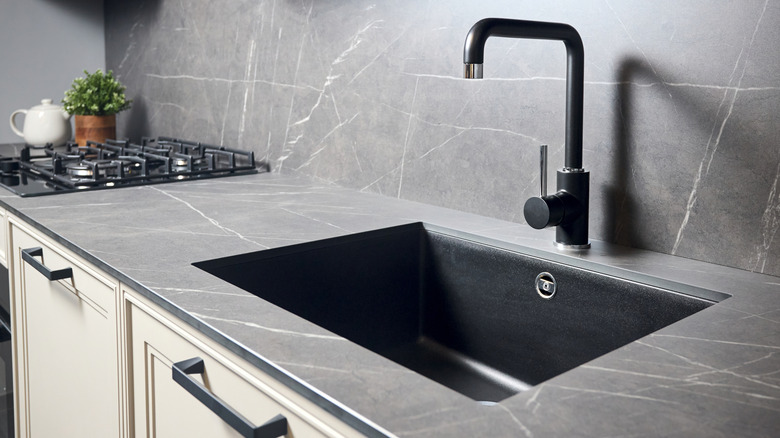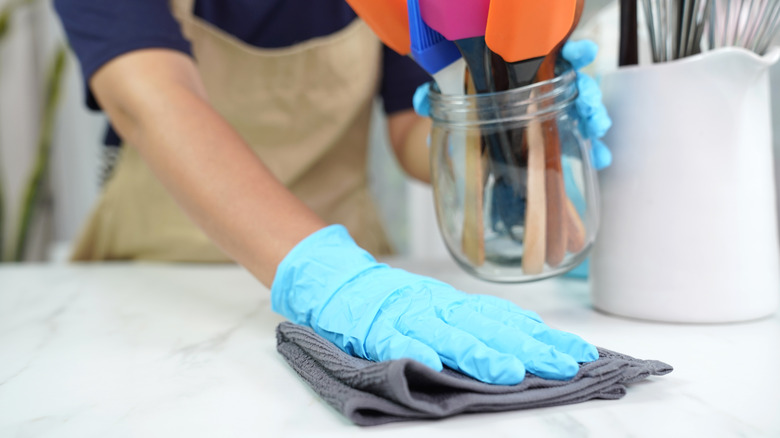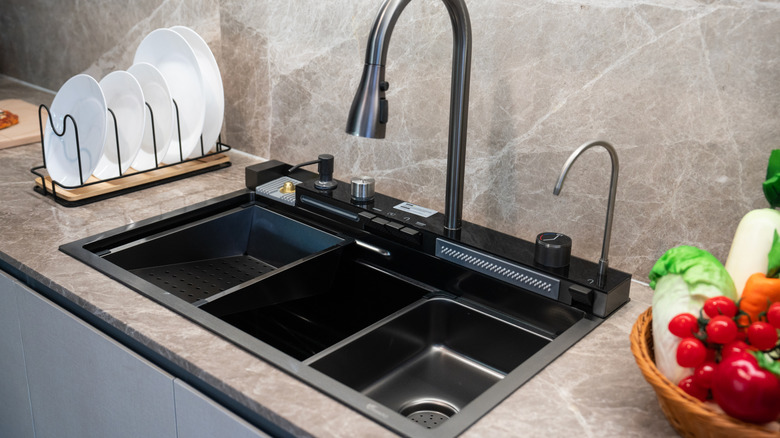The Importance Of Regular Sealing For Matte Countertops
We may receive a commission on purchases made from links.
When you're picking out a new countertop for your kitchen, choosing a material is just the first step. You'll also need to review the most common countertop edge styles, and decide between either a matte finish or a glossy finish. Glossy finishes tend to look sleek and bright, since they reflect both natural and artificial light. They can also create the illusion of more space, which can be particularly helpful in a small kitchen. A matte finish, on the other hand, will give off a more subtle look, and does a better job of hiding nicks and scratches. Plus, it's great for reducing glare. With matte countertops, you'll want to learn about the importance of regular sealing. This essential maintenance task will protect your countertops from all manner of stains, scratches, and smudges. It's overall one of the best ways to ensure that your kitchen lasts for as long as possible.
Since matte countertops can better hide small stains and defects, you might guess at first glance that they require less frequent sealing and maintenance. However, how often you seal your countertops mostly depends on what the surface is made of and how often you use them, rather than what finish they have. Materials like marble and granite, for example, require significantly more attention than manufactured surfaces, such as quartz. Regardless of what your matte countertop is made of, sealing it will help protect its finish.
Key benefits of sealing your matte countertops
Protecting the finish of your stone countertops isn't the only reason that you should regularly seal the surface. When you apply the sealant, you're also protecting your countertop against everyday liquid spills that could damage it. Coffee, wine, and olive oil can all leave stains if you're not performing regular maintenance. Sealing your countertops is also a good way of preventing acidic foods and ammonia-based cleaning products from etching the stone. Etch marks are essentially chemical burns that show where the acidic substance came into contact with the calcium carbonate in the stone. Vinegar, in particular, can leave damaging marks on matte countertops that detract from the finish quality. Thankfully, products like MB Stone Care Touch-Up Etch Remover can sometimes restore the surface.
Sealing your matte countertops can also make the natural beauty of the stone more visually apparent. In other words, it can aid you with making your countertop look new again. Sealant can also help protect your kitchen's key surfaces against scratches and bumps that result from regular, daily use. Additionally, sealing your countertop can be beneficial simply because it makes the surface of the stone easier to clean. Marble and granite, for example, are relatively porous materials that will absorb dirt and germs when they're not sealed regularly. In fact, your countertops are probably amongst the most common items in your kitchen that you should clean more often, since doing so will make them a safer food preparation space.
How to tell if your matte countertops require sealing
To check if your countertops need to be resealed, pour a couple of tablespoons of water onto the surface. Then, time how long it takes for the countertop to absorb the water, if it does at all. If the surface changes color or darkens within 30 minutes, it might be time to reapply your sealant. Conversely, if the water does not interact with the stone within a half hour, then your countertops are likely in good shape for the time being, and you should wipe up the water. By performing this test every so often, you can protect the matte finish of your countertops and ensure that the stone remains a core element of your kitchen's visual and functional design for years to come.
How often you should seal your matte countertop varies significantly depending on the material that the surface is made from. If you have a marble countertop, you generally need to seal the stone once every six months. Granite countertops require sealing once every 12 to 18 months. Quartzite countertops, meanwhile, only need sealing once a year. If you have a quartz countertop, you don't need to seal it all, since the material isn't porous. Regardless of what type of surface you're working with, you should ask your countertop supplier for detailed maintenance directions after installation. You should also read up on the best method for cleaning and maintaining your matte countertops.


